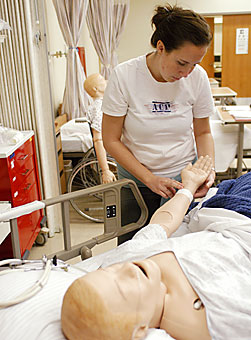 |
|
CASSIE TOMLIN/ Arizona Daily Wildcat
|
Second-semester nursing student Vanessa Jacobs takes the pulse of a computer-controlled mannequin in the College of Nursing last week. The UA is taking steps to counter the nationwide shortage of nurses by implementing accelerated programs.
|
|
|
By Cassie Tomlin
Arizona Daily Wildcat
Monday, November 29, 2004
Print this
The UA College of Nursing is taking steps to help relieve a national shortage of nurses. Along with an accelerated nursing program implemented last year, officials in the college say they are lobbying to expand the resources in the school to provide room for more students.
Jayne Matte, a nurse recruiter at University Medical Center, said the shortage is due mainly to an aging nursing population.
"The average age of a regular nurse is progressively increasing," she said. "In Arizona right now, it's 48. If you think about it, that encroaches the retirement age, and will cause a significant shortage in the future."
Matte said a lack of nurses has forced UMC to rely on supplemental nurses who are temporary employees.
Matte said the lack of adequate nurses causes a serious danger in hospitals. Nurses are prevalent in all aspects of the hospital visit and the medical process, she said.
"Nurses are the first-line providers in a hospital, in nursing homes and in clinics where nurses are involved," Matte said. "If you or someone you know has ever been hospitalized, you know that the person taking primary care of you is the nurse. They work on assessment, critical care, and they're important for safety and the caring perspective, and teaching the other nurses."
While Matte said the shortage is a problem in all hospitals, UMC is another story.
"The shortage is more pressing here because we have a 1-to-4 ratio of RNs to patients," she said, referring to registered nurses.
Matte said UMC hires 200 nurses every two years.
Matte says she focuses not only on nurse recruitment but retention, as well. She deals with issues relating to job satisfaction, nationwide marketing and advertising.
Michael Tearne, College of Nursing office specialist senior, said of the approximate 200 applicants every semester, the nursing college accepts 50 new students to the program.
"Currently there's a campaign in the college to increase the size and the equipment in the Patient Care Learning Center as part of addressing the nursing shortage," he said.
The Patient Care Learning Center is an interactive laboratory for nursing students to practice clinical checks on computer-controlled mannequins with simulated heartbeats and breathing patterns.
Tearne says he thinks expansion of the facility is integral in the expansion of the school to accommodate more students.
Accelerated nursing program student Amanda McDonald is one of 64 students in the second accelerated program at the UA. The first program last year enrolled just 40 students.
McDonald says the 14-month accelerated nursing program is a direct response to the lack of nurses in the state and speeds nursing students through intense study so they may graduate sooner and join the workforce. The program equals the traditional nursing program in curriculum, but moves faster.
McDonald says her schedule at the nursing college is manageable, although admission is competitive and supply and demand plays a role. McDonald left her house and job in Phoenix to study in the program.
"You have to convince the people in charge of admissions that you've got your life in order," she said. "You can't have a job, you have to accept that, and you have to have a plan about how you're going to work everything out - a coping strategy. Your personal statement explaining that matters a lot, and so do your weighted prerequisite grades."
McDonald spends three days in nursing classes and two 12-hour days in clinical study at UMC every week.
McDonald, who has a bachelor's degree in biology, attributes part of the decrease in available nurses to young women in science and engineering fields finding higher-paying jobs outside of nursing.
She also cites the size of the College of Nursing building as a hindrance to nursing expansion.
"Have you looked around our building?" she asked. "There's not nearly enough room for three years of traditional classes, so a space issue is also holding us back."
